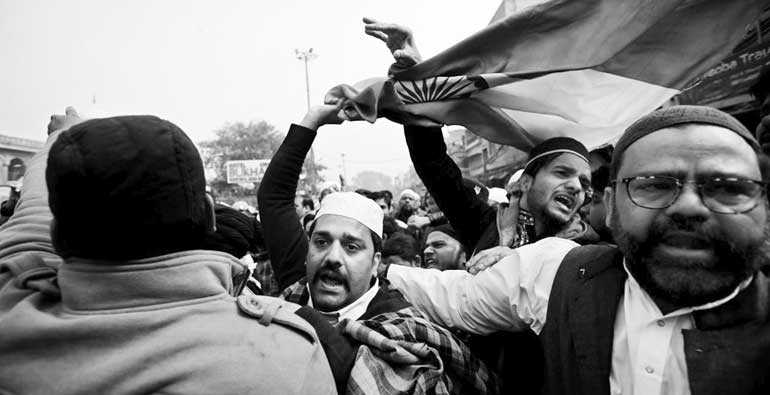Monday Feb 23, 2026
Monday Feb 23, 2026
Saturday, 21 December 2019 00:03 - - {{hitsCtrl.values.hits}}

Demonstrators attend a protest against a new citizenship law, before offering Friday prayers at Jama Masjid in the old quarters of Delhi - Reuters
NEW DELHI (Reuters): Authorities shut down the internet in parts of northern India on Friday and imposed a curfew in a southern city after two people died in clashes between police and stone-throwing protesters angered by a citizenship law that discriminates against Muslims.
Protests have spread across India since the Hindu nationalist government pushed the new law through parliament last week, and mark strongest show of dissent since Prime Minister Narendra Modi swept to power in 2014.
The latest fatalities in the southern coastal city of Mangaluru took the death toll from the protest-related violence to seven.
A police spokesman said 20 officers were injured in the clashes in Mangaluru, and a curfew had been imposed there until midnight on 22 December.
“Police forces are deployed across the city and the law and order situation right now is quite peaceful and everything is under control,” said police spokesman Guru Kamat.
In Uttar Pradesh, India’s most populous state, and one which has been a tinder-box for communal tensions between Hindus and Muslims, authorities ordered mobile internet and text messaging services in seven districts to be taken down until Saturday.
Awanish Kumar Awasthi, the state official issuing the order, said the move was aimed at preventing the spread of inflammatory material that could worsen the law and order situation. Police in Uttar Pradesh also detained around 100 suspected troublemakers.
In New Delhi, police put extra security around Jama Masjid, one of the country’s largest mosques, ahead of Friday prayers.
And the women’s wing of the main opposition Congress party demonstrated outside the home of Home Minister Amit Shah who is leading the change in citizenship law that sets religion as one of the criteria for granting citizenship for the first time.
The new law makes it easier for people from non-Muslim minorities in Afghanistan, Bangladesh and Pakistan who settled in India prior to 2015 to obtain Indian citizenship.
Critics say the exclusion of Muslims is discriminatory, and the award of citizenship based on religion undermines India’s secular constitution.
Opponents see the law as the latest step by Modi’s government to marginalise Muslims, who make up 14% of India’s population.
The government says the law is aimed at helping religious minorities facing persecution in the largely Muslim neighbouring countries.
Some of the most violent protest have been in Assam, a northeast state bordering Bangladesh. Assamese people are angered by the encouragement being given to immigrants, regardless of their religion.